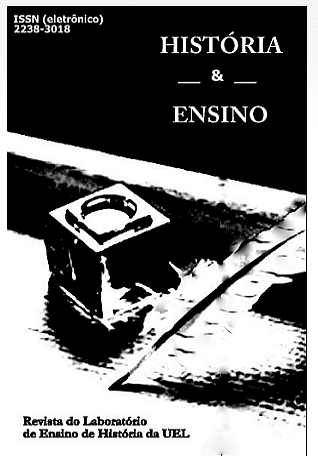Conservative narratives and the kidnapping of the future: Moral and Civics Textbooks (1971)
DOI:
https://doi.org/10.5433/2238-3018.2021v27n2p100Keywords:
Moral and Civics, Teaching History, History of ConceptsAbstract
This article makes a critical reading of the Moral and Civics textbooks produced during the context of the military dictatorship. I selected two volumes for the making of this article, each one of them destined to two different young audiences: Nelson Barbosa's Moral e Cívica and Edilia Coelho Garcia's Educação Moral e Cívica na Escola Média. Both of them were published in 1971- a historical context known for its authoritarian stultification. I chose for his investigation the concepts of citizenship, development, progress, nationalism, patriotism, democracy, modernity, civics, races - ethnical identities, more precisely- and nation. Understanding the textbooks as materials that produce a temporal and pedagogical sense for young students, I frame them not only as textbooks but also as cultural teaching artifacts of a "philosophy of history", once that the Moral and Civics materials seek to offer a practical-temporal substance for the concepts of Brazilian modernity and its cultural aspects. One can figure that the selection of the concepts has as premise its modern historicity. Something that therefore had taken me to look after the place of European experience into the narrative of these materialsDownloads
Download data is not yet available.
References
ANDERSON, Benedict. Comunidades imaginadas: reflexões sobre a origem e a difusão do nacionalismo. São Paulo: Companhia das Letras, 2008.
BARBOSA, Nélson. Educação moral e cívica. Araçatuba: Itamaraty, 1971. v 3.
BEVERNAGE, Berber. From philosophy of history to philosophy of historicities: some ideas on a potential future of historical theory. BMGN Low Countries Historical Review, Netherlands, v. 127, n. 4, p. 113-120, 2012. Disponível em: https://bmgn-lchr.nl/article/view/URN%3ANBN%3ANL%3AUI%3A10-1-109891/5907. Acesso em: 20 maio 2022.
CHOPPIN, Alain. Políticas dos livros escolares no mundo: perspectiva comparativa e histórica. Tradução Fernanda de Bastani Busnello. História da Educação, Pelotas, v. 12, n. 24, p. 9-28, 2008.
DIRLIK, Arif. Is there history after eurocentrism? globalism, postcolonialism, and the disavowal of history. Cultural Critique, Minneapolis, n. 42, p. 1-34, 1999. Disponível em: https://www.jstor.org/stable/1354590?seq=1. Acesso em: 20 maio 2022.
DUSSEL, Enrique. 1942 o encobrimento do outro: a origem do "mito da modernidade". Petrópolis: Vozes, 1993. Disponível em: https://enriquedussel.com/txt/Textos_Libros/45.1492_O_encobremento_do_outro.pdf. Acesso em: 20 maio 2022.
FANON, Frantz. Black skin, white masks. London: Pluto Press, 2008.
FANON, Frantz. The wretched of the earth. New York: Grove Press, 2005.
FILGUEIRAS, Juliana Miranda. A educação moral e cívica e sua produção didática: 1969-1993. 2006. Dissertação (Mestrado em Educação: História, Política, Sociedade) - Pontifícia Universidade Católica, São Paulo, 2006. Disponível em: https://tede2.pucsp.br/bitstream/handle/10549/1/Dissertacao%20Juliana%20Miranda%20Filgueiras.pdf. Acesso em: 20 maio 2022.
GARCIA, Edilia Coelho. Educação moral e cívica na escola média. São Paulo: Editora Didática Irradiante, 1971.
GOMIDES, Fernanda de Paula. Representações de cidadania nos livros didáticos de educação moral e cívica durante o regime militar brasileiro (1964-1985). 2015. Dissertação (Mestrado em Educação) - Universidade Federal da Paraíba, João Pessoa, 2015. Disponível em: https://repositorio.ufpb.br/jspui/bitstream/tede/8571/2/arquivototal.pdf. Acesso em: 20 maio 2022.
KOSELLECK, Reinhardt. Estratos do tempo: estudos sobre história. 2. ed. Rio de Janeiro: Contraponto: PUC Rio, 2014.
LOSURDO EXPLICA: NAZISMO, FASCISMO e COMUNISMO [legendado]. [S. l.: s. n.], 2019. 1 vídeo (17 min). Publicado pelo canal TV Boitempo. Disponível em: https://www.youtube.com/watch?v=kMxrFxDKDiw&t=25s. Acesso em: 25 maio 2022.
LOSURDO, Domenico. Para uma crítica da categoria de totalitarismo. Crítica Marxista, São Paulo, n. 17, p. 51-80, 2003. Disponível em: https://www.ifch.unicamp.br/criticamarxista/arquivos_biblioteca/artigo100artigo3.pdf. Acesso em: 20 maio 2022.
MOLLO, Helena; TURIN, Rodrigo; NICOLAZZI, Fernando. The thickness of time: the writing of history and appropriation of the past in Brazil 1830-1930. Historein, Athens, v. 17, n. 1, 2018. Disponível em: https://ejournals.epublishing.ekt.gr/index.php/historein/article/view/8782/14250. Acesso em: 20 maio 2022.
MUDROVIC, María Inés. Historical Narrative as a Moral Guide and the Present as History as an Ethical Project. História da Historiografia, Ouro Preto, v. 9, n. 21, p. 10-24, 2016. Disponível em: https://www.historiadahistoriografia.com.br/revista/article/view/1024/634. Acesso em: 20 maio 2022.
QUIJANO, Aníbal. Colonialidad del poder, Eurocentrismo y América Latina. In: LANGDER, Edgardo (org.). La colonialidad del saber: eurocentrismo y ciencias sociales perspectivas latino-americanas. Buenos Aires: CLACSO, 1993. p. 122-151. Disponível em: http://biblioteca.clacso.edu.ar/clacso/sur-sur/20100708034410/lander.pdf. Acesso em: 20 maio 2022.
RUSEN, Jorn. Aprendizagem histórica: fundamentos e paradigmas. Curitiba: W&A Editores, 2012.
RUSEN, Jorn. Razão histórica: teoria da história fundamentos da ciência histórica. Tradução Estevão de Rezende Martins. Brasília: UnB, 2001. Disponível em: https://docs.google.com/file/d/0B46vjiRI8hGuQk9ablpDcHphcjA/edit?resourcekey=0-9NNsJVZJDM2RZG7fY-m6dw. Acesso em: 20 maio 2022.
SANTOS, Marcia Regina dos. A voz do suporte: análise de um manual de Moral e Cívica em Florianópolis/1971. In: SEMINÁRIO INTERNACIONAL DE HISTÓRIA DO TEMPO PRESENTE, 2., 2014, Florianópolis. Anais [...]. Florianópolis: UDESC, 2014. Disponível em: http://eventos.udesc.br/ocs/index.php/STPII/tempopresente/paper/viewFile/139/77. Acesso em: 20 maio 2022.
SETH, Sanjay. Razão ou raciocínio? Clio ou Shiva?. História da Historiografia, Ouro Preto, v. 6, n. 11, p. 173-189, 2013. Disponível em: https://www.historiadahistoriografia.com.br/revista/article/view/554/352. Acesso em: 20 maio 2022.
SIMON, Zoltán Boldizsár. Os teóricos da história possuem uma teoria da história? Reflexões sobre uma não disciplina. História da Historiografia, Ouro Preto, v. 12, n. 29, p. 53-68, 2019. Disponível em: https://www.historiadahistoriografia.com.br/revista/article/view/1461/785. Acesso em: 20 maio 2022.
VAINFAS, Ronaldo. Colonização, miscigenação e questão racial: notas sobre equívocos e tabus da historiografia brasileira. Artigo disponível em: https://www.historia.uff.br/tempo/artigos_dossie/artg8-1.pdf. Acesso em 07 de junho de 2022.
VELOSO, Sheyla Maria Tavares; TORRENTES, José Vinícius. Os discursos para a formação do cidadão nos livros de OSPB e Educação Moral e Cívica na ditadura militar. In: ENCONTRO CIENTÍFICO CULTURAL INTERINSTITUCIONAL, 14., 2016, [s. l.]. Anais [...]. [S. l.]: FAG: Dom Bosco, 2016. p. 1-10. Disponível em: https://www.fag.edu.br/upload/ecci/anais/5b91279dd6c06.pdf. Acesso em: 20 maio 2022.
BARBOSA, Nélson. Educação moral e cívica. Araçatuba: Itamaraty, 1971. v 3.
BEVERNAGE, Berber. From philosophy of history to philosophy of historicities: some ideas on a potential future of historical theory. BMGN Low Countries Historical Review, Netherlands, v. 127, n. 4, p. 113-120, 2012. Disponível em: https://bmgn-lchr.nl/article/view/URN%3ANBN%3ANL%3AUI%3A10-1-109891/5907. Acesso em: 20 maio 2022.
CHOPPIN, Alain. Políticas dos livros escolares no mundo: perspectiva comparativa e histórica. Tradução Fernanda de Bastani Busnello. História da Educação, Pelotas, v. 12, n. 24, p. 9-28, 2008.
DIRLIK, Arif. Is there history after eurocentrism? globalism, postcolonialism, and the disavowal of history. Cultural Critique, Minneapolis, n. 42, p. 1-34, 1999. Disponível em: https://www.jstor.org/stable/1354590?seq=1. Acesso em: 20 maio 2022.
DUSSEL, Enrique. 1942 o encobrimento do outro: a origem do "mito da modernidade". Petrópolis: Vozes, 1993. Disponível em: https://enriquedussel.com/txt/Textos_Libros/45.1492_O_encobremento_do_outro.pdf. Acesso em: 20 maio 2022.
FANON, Frantz. Black skin, white masks. London: Pluto Press, 2008.
FANON, Frantz. The wretched of the earth. New York: Grove Press, 2005.
FILGUEIRAS, Juliana Miranda. A educação moral e cívica e sua produção didática: 1969-1993. 2006. Dissertação (Mestrado em Educação: História, Política, Sociedade) - Pontifícia Universidade Católica, São Paulo, 2006. Disponível em: https://tede2.pucsp.br/bitstream/handle/10549/1/Dissertacao%20Juliana%20Miranda%20Filgueiras.pdf. Acesso em: 20 maio 2022.
GARCIA, Edilia Coelho. Educação moral e cívica na escola média. São Paulo: Editora Didática Irradiante, 1971.
GOMIDES, Fernanda de Paula. Representações de cidadania nos livros didáticos de educação moral e cívica durante o regime militar brasileiro (1964-1985). 2015. Dissertação (Mestrado em Educação) - Universidade Federal da Paraíba, João Pessoa, 2015. Disponível em: https://repositorio.ufpb.br/jspui/bitstream/tede/8571/2/arquivototal.pdf. Acesso em: 20 maio 2022.
KOSELLECK, Reinhardt. Estratos do tempo: estudos sobre história. 2. ed. Rio de Janeiro: Contraponto: PUC Rio, 2014.
LOSURDO EXPLICA: NAZISMO, FASCISMO e COMUNISMO [legendado]. [S. l.: s. n.], 2019. 1 vídeo (17 min). Publicado pelo canal TV Boitempo. Disponível em: https://www.youtube.com/watch?v=kMxrFxDKDiw&t=25s. Acesso em: 25 maio 2022.
LOSURDO, Domenico. Para uma crítica da categoria de totalitarismo. Crítica Marxista, São Paulo, n. 17, p. 51-80, 2003. Disponível em: https://www.ifch.unicamp.br/criticamarxista/arquivos_biblioteca/artigo100artigo3.pdf. Acesso em: 20 maio 2022.
MOLLO, Helena; TURIN, Rodrigo; NICOLAZZI, Fernando. The thickness of time: the writing of history and appropriation of the past in Brazil 1830-1930. Historein, Athens, v. 17, n. 1, 2018. Disponível em: https://ejournals.epublishing.ekt.gr/index.php/historein/article/view/8782/14250. Acesso em: 20 maio 2022.
MUDROVIC, María Inés. Historical Narrative as a Moral Guide and the Present as History as an Ethical Project. História da Historiografia, Ouro Preto, v. 9, n. 21, p. 10-24, 2016. Disponível em: https://www.historiadahistoriografia.com.br/revista/article/view/1024/634. Acesso em: 20 maio 2022.
QUIJANO, Aníbal. Colonialidad del poder, Eurocentrismo y América Latina. In: LANGDER, Edgardo (org.). La colonialidad del saber: eurocentrismo y ciencias sociales perspectivas latino-americanas. Buenos Aires: CLACSO, 1993. p. 122-151. Disponível em: http://biblioteca.clacso.edu.ar/clacso/sur-sur/20100708034410/lander.pdf. Acesso em: 20 maio 2022.
RUSEN, Jorn. Aprendizagem histórica: fundamentos e paradigmas. Curitiba: W&A Editores, 2012.
RUSEN, Jorn. Razão histórica: teoria da história fundamentos da ciência histórica. Tradução Estevão de Rezende Martins. Brasília: UnB, 2001. Disponível em: https://docs.google.com/file/d/0B46vjiRI8hGuQk9ablpDcHphcjA/edit?resourcekey=0-9NNsJVZJDM2RZG7fY-m6dw. Acesso em: 20 maio 2022.
SANTOS, Marcia Regina dos. A voz do suporte: análise de um manual de Moral e Cívica em Florianópolis/1971. In: SEMINÁRIO INTERNACIONAL DE HISTÓRIA DO TEMPO PRESENTE, 2., 2014, Florianópolis. Anais [...]. Florianópolis: UDESC, 2014. Disponível em: http://eventos.udesc.br/ocs/index.php/STPII/tempopresente/paper/viewFile/139/77. Acesso em: 20 maio 2022.
SETH, Sanjay. Razão ou raciocínio? Clio ou Shiva?. História da Historiografia, Ouro Preto, v. 6, n. 11, p. 173-189, 2013. Disponível em: https://www.historiadahistoriografia.com.br/revista/article/view/554/352. Acesso em: 20 maio 2022.
SIMON, Zoltán Boldizsár. Os teóricos da história possuem uma teoria da história? Reflexões sobre uma não disciplina. História da Historiografia, Ouro Preto, v. 12, n. 29, p. 53-68, 2019. Disponível em: https://www.historiadahistoriografia.com.br/revista/article/view/1461/785. Acesso em: 20 maio 2022.
VAINFAS, Ronaldo. Colonização, miscigenação e questão racial: notas sobre equívocos e tabus da historiografia brasileira. Artigo disponível em: https://www.historia.uff.br/tempo/artigos_dossie/artg8-1.pdf. Acesso em 07 de junho de 2022.
VELOSO, Sheyla Maria Tavares; TORRENTES, José Vinícius. Os discursos para a formação do cidadão nos livros de OSPB e Educação Moral e Cívica na ditadura militar. In: ENCONTRO CIENTÍFICO CULTURAL INTERINSTITUCIONAL, 14., 2016, [s. l.]. Anais [...]. [S. l.]: FAG: Dom Bosco, 2016. p. 1-10. Disponível em: https://www.fag.edu.br/upload/ecci/anais/5b91279dd6c06.pdf. Acesso em: 20 maio 2022.
Downloads
Published
2022-06-15
How to Cite
Macedo, A. L. N. (2022). Conservative narratives and the kidnapping of the future: Moral and Civics Textbooks (1971). História & Ensino, 27(2), 100–123. https://doi.org/10.5433/2238-3018.2021v27n2p100
Issue
Section
Artigos
License
Copyright (c) 2021 História & Ensino

This work is licensed under a Creative Commons Attribution 4.0 International License.
História & Ensino adota a licença CC-BY esta licença permite que os reutilizadores distribuam, remixem, adaptem e criem a partir do material em qualquer meio ou formato, desde que a atribuição seja dada ao criador. A licença permite o uso comercial.























